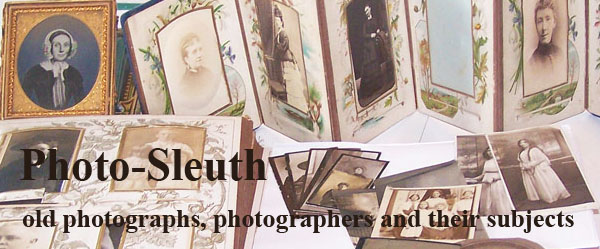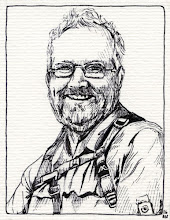
The large format photograph appears to have been trimmed, perhaps to fit in an album, and now measures 153 x 110 mm. It depicts a group of 32 boys and two young women teachers arranged in front of a large brick building.

There is an "X" inked on the photograph above a boy in the back row (third from the right), and a note on the back, written by my aunt, states that "X = Dad C.L.L.P." i.e. my grandfather Charles Leslie Lionel Payne (1892-1975). One of the boys seated on the ground in the front row is holding what appears to be a slate, and it is possible that this originally had the school and class number or name written on it.

I've tried to enhance the image of the slate, but nothing is visible now - perhaps there never was anything written there. However, an additional note on the reverse by my aunt, "School Group St. James," identifies it as St James' Board School, which was situated on the corner of St James' Road and Hastings Street in New Normanton, close to where my grandfather's family lived in the 1890s and early 1900s. My father wrote the following notes in December 2001 (the notes in square brackets thus [] are mine):
My father [i.e. CLLP] always talked about having been a pupil "at Abbey Street," and it’s probable that he went there from the Hastings Street school which Slater – in his house numbering diagram – calls "St James’ Board Schools (erected 1880)." When did he move up? – When he was 10, before the Abbey Street institution became the D.M.S.S.? [which was in 1903 or 1904]All of the boys look to be of approximately the same age, which I would guess is about seven years old. My grandfather was born on 9 April 1892, so if my estimate is correct within a year either way, then the photo would have been taken c. 1898-1900. The styles of clothing worn by the two young women teachers in the photograph are about right for this period.
St James was built by the Derby School Board in 1879 and 1880 at a cost of just under £12,000 and initially catered for 750 children (Source: The Derby Mercury, dated 20 March 1878 and 23 Feb 1881). The school's first boys' head master was James Edward Kaye, while the girls' mistress was Miss Edith Wright, and Miss Elinor Crighton was the infants' mistress. T. Bulmer's 1895 History, Topography and Directory of Derbyshire (from an extract in Bulmer's Derby 1895, reprinted by Derbyshire County Council in 1988, ISBN 0 903463 26 1) shows Mr. Kaye and Miss Crighton still in the same positions, while Miss. Mary A. Harsley had become head mistress of the senior girls, and Miss Harriet G. Martin, the head mistress of junior mixed.

In that year (1895), according to Kelly's Directory of Derbyshire for 1899 (see extract above, courtesy of the University of Leicester's Historical Directories) the school was enlarged so that by 1899 it had an average attendance of 1864 children, comprising "442 senior boys, 370 senior girls, 357 junior boys, 255 junior girls & 430 infants." The only senior staff change in the previous four years was that Miss Eliza Hall had replaced Miss Crighton as the infants' mistress.
View Larger Map
The original Derby Board School buildings were recently demolished and replaced with a brand new school (see satellite image above). However, I was very lucky that a few years ago Derby resident Paul Slater very kindly took some photographs of the St James' Road Board School for me. I am very grateful to Paul for these and have reproduced them below.

St James' Road Board School, corner of Hastings Street & St James' Road, Normanton, Derby, January 2000
Photograph & Image © and courtesy of Paul Slater

St James' Road Board School, corner of St James' Road & Dover Street, Normanton, Derby, January 2000
Photograph & Image © and courtesy of Paul Slater

St James' Road Board School, St James' Road, Normanton, Derby, January 2000
Photograph & Image © and courtesy of Paul Slater








Back in around 2009 I had intended asking the head teacher of Hardwick school if I could pop in one holiday when the kids were away to photograph my old school. I decided to take a detour on my drive home so I passed the school but saw that the school's re-development was well under way (the Boys' Junior buildings were no longer there and the other buildings were being demolished). It's a bit of a shame but the building was well past its sell by date when I attended in the late 1960s
ReplyDeleteThanks for your comment, Peter (I'm a bit late in responding, sorry). Of course not all old buildings can be saved, or possibly are even worth saving.
DeleteI went to the old Hardwick school as it had become 1954-1960 the headmistress was Isobel Mary Rodgers and I received the best education that you could wish for. In fact, when I went to the old "Tech" as it was called then, there were girls from "posher" schools, but they were academically inferior to us
ReplyDelete